Huawei MateBook X Pro (2021) Review: A Sleek and Vibrant Notebook
by Dr. Ian Cutress on September 28, 2021 9:00 AM EST- Posted in
- Notebooks
- Intel
- Huawei
- Laptops
- Matebook X Pro
- Tiger Lake
Power and Storage Performance
The Intel Core i7-1165G7 inside the Huawei MateBook X Pro 2021 is a quad-core 11th Generation Tiger Lake processor, and is part of Intel’s top Core i7 family for notebooks. It is technically the lowest member of that family, being around 100-200 MHz lower on the CPU and 100 MHz lower on the GPU. Those integrated graphics though are technically Intel’s best, offering 96 Execution Units of the latest Xe-LP generation. The CPU is paired with 16 GB of LPDDR4X-4266, which is the best memory for any mobile processor in this generation.
The main competition for a processor like this is anything under AMD’s Ryzen 7 lineup, either the R7 4700U (a Zen 2 processor) or the R7 5800U (a Zen 3 processor). However, as is often the case with laptops, it comes down to what exactly the processor is tuned for. Intel lists the TDP range for its 11th Generation Tiger Lake U-series processors as anywhere from a 15 W TDP up to a 50 W all-core turbo.
In our power testing, we took a number of tests during our regular benchmark suite, using the operating system default power modes while plugged in, and here are some insights.
If we just look at a high performance environment, we get a 38 W peak power consumption for the processor, which over the course of 20 seconds decreases to around 18 W, then over the course of 40 seconds moves down to a steady state of 15 W. This is Intel’s Adaptix technology in action, where the peak power of the CPU is adjusted on the fly through a weighted moving average. We saw 4.7 GHz as a peak single core frequency, and then at sustained 15 W load, the processor was running at 1900-2000 MHz.
By contrast, our 3DPM test is also a good computational load, however it does 10 seconds of high performance followed by 10 seconds of idle.
In this test we only see a peak at 29 W, with the CPU moving to a more steady state power consumption over the 10 seconds of each test. It never gets there before the idle time comes in, which restores some of the power budget, ready to turbo up a big higher for the next cycle. This is also an all-core test, and we saw all-core frequencies around 2400-2500 MHz for this.
The software we use unfortunately was not able to record a temperature reading (our results files say 28ºC for everything), but during regular use on a lap, the unibody metallic chassis did get warm to the touch, but not uncomfortably so. For anyone doing extended video editing on this, it is probably worth putting it on the table, and not trapped inside the duvet.
Storage Performance
Inside the Huawei MateBook X Pro 2021 is a mainstream high-end PCIe 3.0 x4 NVMe drive: the 1 TB Samsung PM981a, which we reviewed back in 2017, and at the time it set the bar for how TLC-based drives should behave for well-rounded performance.
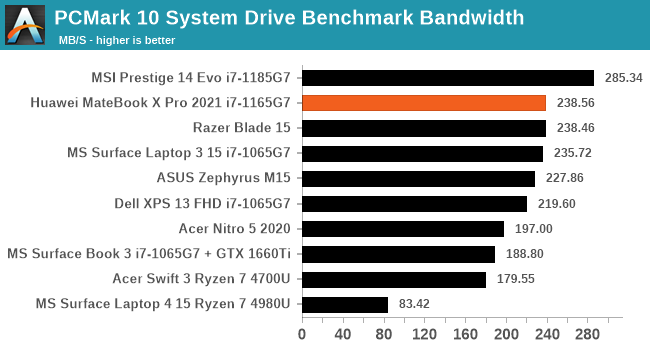
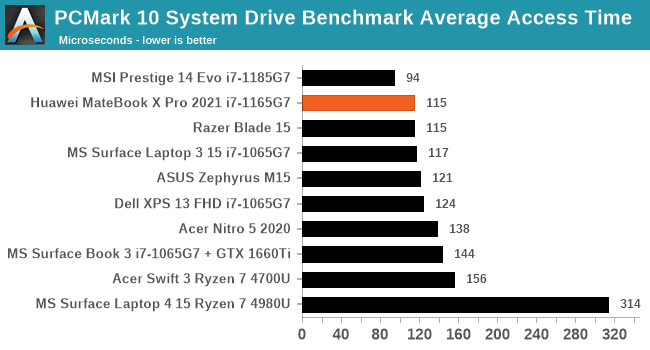
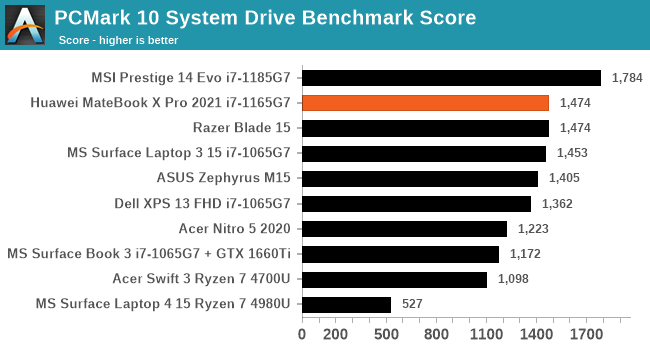
Compared to a good number of similar devices we have tested recently, the Huawei MateBook X Pro comes out near the top on storage performance. It loses losing mostly to the MSI Presige 14 Evo, but that has a slightly faster processor and a PCIe 4.0 NVMe drive, but also because that device was one of Intel’s flagship design wins for this generation.


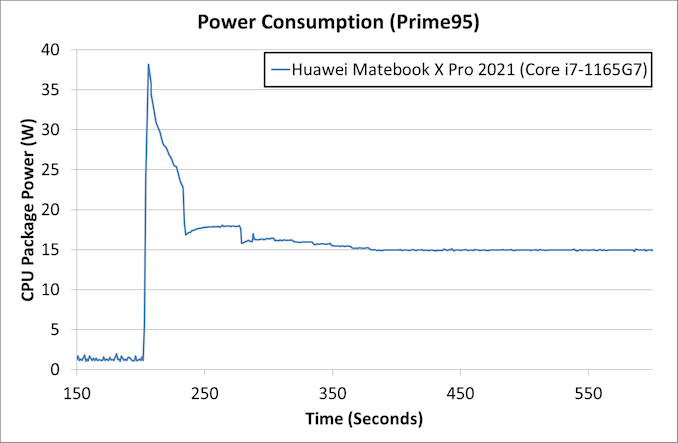
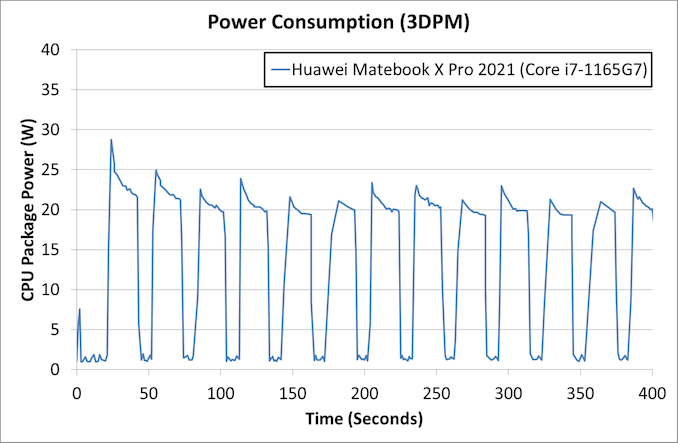








84 Comments
View All Comments
Oliveira_Salazar - Tuesday, September 28, 2021 - link
Very poor review.No direct comparisons with the latest MacBook Air. No M1 mention at all.
It would be extremely easy to include the MacBook Air and/or Pro in a lot if not most of these benchmarks/comparisons. Even the Intel version.
The MBA is the default laptop of this category and everything should be considered against it. Let's not even mention how inspired Huawei is by MBP's designs. You mention that they are trying to place this in a segment where the Macs are their main competition, but don't feature them in any testing at all?
It's pathetic.
This machine is absolutely obliterated performance wise in all metrics. Specially while on battery.
You only make a poor argument that "an equivalent specced Mac is +800$", but "wins on battery life and performance". Is that fair? Is that the whole relevant story? Wouldn't a competent review also include something like "a 500$ to sometimes 600$ cheaper, completely silent MacBook Air beats this in almost all performance metrics and usage scenarios, sometimes by a lot, and wins heavily in battery life too, but only has 8GB of RAM and 256GB of storage, while a version with the same RAM and Storage costs only 100 to 200$ more"
Why isn't there detailed performance testing while on battery power? These are thin and light machines for a reason. It's incredibly low effort to default to a pathetic "browsing test" and "200 nit video playback" to measure battery life.
People use these devices on the road. The default state of all laptops is unplugged. All performance testing should be done by default while on battery, and a separate one while plugged in, all conditions the same, and conclusions should be made.
Unless someone really really needs windows, these laptops should never be recommended at this point. They have are horrific value compared to what an Air offers while on battery.
But people that only read this review wouldn't know.
dontlistentome - Tuesday, September 28, 2021 - link
I'll bite.The MBA is the default laptop of this category - no, it really isn't. If you need to fit into a Windows infrastructure, the default will likely have a HP, Dell or Thinkpad logo on it. Macs are *horrible* to use in a corporate environment. Given their input into the protocol the Thunderbolt implementation is borked (mostly round MST tagging for multiple displays). But then again the MBA can only drive one external panel.
Your price comparisons are **way** out. A Macbook with 16gb/512GB is not $200 more, it is $400 more minimum - the closest comparitor to this is $1450 - $50 less and that's before discounts which don't exist on Apple.
My team has 50+ laptops - mostly Thinkpad X1 Carbon of various gens, some Macs for the off balls. They are used 95% at a desk with power. That's the PCs and Macs (including the M1 Macbooks).
Go off and have a cuddle with your Macbook and feel great about what a genius you are. Meanwhile the rest of the world is still Windows.
lemurbutton - Tuesday, September 28, 2021 - link
I'll bite.The Macbook Air M1 is significantly better than this laptop, and any Windows laptop in its class. Windows itself is less advanced than MacOS. The only thing Windows has that the Mac doesn't is AAA games. That's it. The Mac does everything else better.
Your Thinkpad X1 Carbon sucks compared to M1 Macs.
They should fire you for not buying M1 Macs.
dontlistentome - Tuesday, September 28, 2021 - link
I have both (X1 Gen 9 / MBA M1). Do you?dnanatech - Wednesday, September 29, 2021 - link
I have/had all of those (i7 X1gen6, i7 Matebook XP 2018, M1 MBA), and i7 Latitude 7390.The Mac is significantly better than all 3. X1 has unreliable fingerprint reader, a dim screen, weirdo Fn vs Cntrl key layout (i know it can be re-mapped in BIOS), overheats like a furnace, etc.
Worst of all, all the Windows machine have various battery-performance issues (sleep/hibernate drain, pickiness on chargers, low charging rate, etc), some of which is due to the common OS layer, and some of which is hardware unique to each machine.
It's not limited to these 4 device samples and generation. This goes back many generations to other machines I've had both on Windows side and Apple. Some of the Windows machine are sanitized as corporate-managed devices, and the others I've kept barebone and lean. After a long enough, I have to assume it's the nature of Windows laptops to have battery-related issues.
gescom - Tuesday, September 28, 2021 - link
"Thinkpad X1 Carbon sucks compared to M1 Macs"Please do elaborate.
mmrezaie - Tuesday, September 28, 2021 - link
I had to buy Macbook pro M1, because I needed a laptop and I couldn't find X1 anywhere and lenovo support told me it may take a very long time. M1 laptops are amazing, but X1 is something else. I will still if I had a choice would go X1, just for the keyboard and Linux.Samus - Wednesday, September 29, 2021 - link
My wife had a MBP M1 and returned it after a week. Running legacy applications was like using a Core 2 Duo-era Macbook. And MOST PROGRAMS ARE LEGACY PROGRAMS. I don't think people realize even ADOBE hasn't ported even half their creative suite to M1. And many of the legacy apps have known issues. For example, you can't use Adobe Forms for Acrobat. Literally, the program CANNOT RUN on M1.https://helpx.adobe.com/download-install/kb/apple-...
So unless you exclusively use Apple software and treat the machine like a toy for Safari, Mail and Photos, it's unreliable and the power is wasted.
She went back to using her 2018 MBP and fixed the keyboard that was the problem anyway, and will wait a year or two before revisiting a new Macbook.
mmrezaie - Wednesday, September 29, 2021 - link
Well, I do a lot of data science development and also system software developments. M1 is very good. My grip is with macOS. There are so many quirks I want to do which I cannot, but I could in Linux. On the other hand, macOS has much better support on desktop side compared to Linux.If I could have M1 arm on Linux, ooh that would be one sexy long battery and capable enough muchine.
star-affinity - Saturday, October 2, 2021 - link
”My grip is with macOS. There are so many quirks I want to do which I cannot, but I could in Linux.”Could you mention a few examples of those quriks? Just curios...